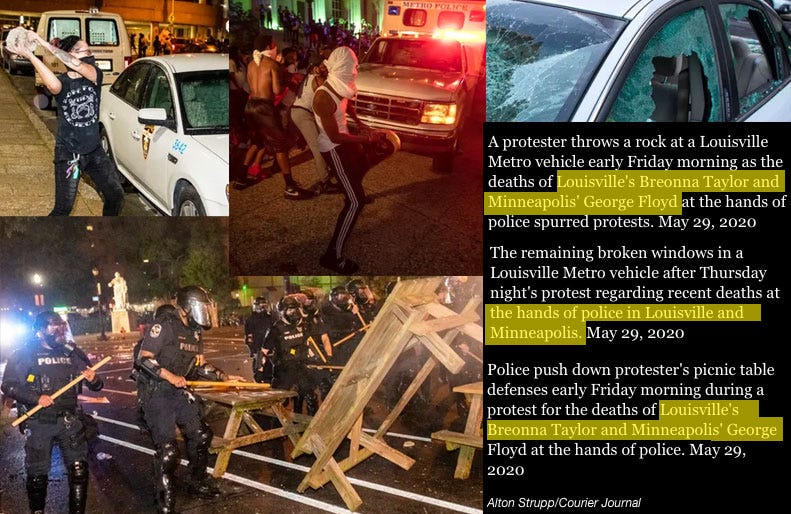Minneapolis and Louisville: Haunting Parallels, Good Differences
George Floyd narrative blown sky-high in documentary film, The Fall of Minneapolis; KY Republicans have starring roles in preventing the Fall of Louisville
USA v. Brett Hankison Mistrial, Post 2- Part 1 of Haunting Parallels, Good Differences
A meaty documentary, The Fall of Minneapolis, was released the same day that USA v. Brett Hankison was declared a mistrial. This dovetail was oddly coincidental— Pay attention, Louisville!
The film presents the truth about the George Floyd incident, forever removing the official cover-up. And it holds promise for a change in the Breonna Taylor narrative to emerge.
As we await the December 13 Mistrial Conference that will likely determine whether Brett is re-tried or has his case dismissed, let’s consider the parallels and differences in the Taylor and Floyd events.
Brief Review of Cases
Early on, their deaths were bracketed by the media. The screenshots below from Courier-Journal slides with photo captions, show rioting in Louisville in May 2020. Protests continued through the early fall.
Officer Derek Chauvin’s case was initially assigned to MN Attorney General, Keith Ellison, by MN Governor Tim Walz. Walz did not think the attorney in Hennepin County (Minneapolis) could fairly or impartially prosecute the case due to the publicity. However, the case was assigned by Ellison to the Hennepin Co. Fourth Judicial District Judge. Ellison elevated the charges against Chauvin to second-degree murder, and filed charges against three other policemen for aiding and abetting him. The rioters demanded a guilty verdict and a murder conviction. All four men are now in prison.
Hankison’s case was at first in the purview of the LMPD and then the Jefferson Co. Commonwealth Attorney, Tom Wine, as one of the officers who fired his weapon during the raid. Wine was involved in prosecuting Breonna’s boyfriend, Kenneth Walker, for shooting Sgt. Mattingly, and recused himself from the case, sending it to Kentucky’s Attorney General, Daniel Cameron. A Grand Jury under Cameron’s oversight did not find the officers guilty in Breonna’s death, though Brett was indicted for ‘wanton endangerment.’ Protesters returned to rioting and two LMPD officers were shot, but recovered. There was much more fallout for Louisville, and it continues today.
Significant Differences
Efforts by Louisville officials to counter the false narrative were made. Judge Audra Eckerle ruled that city officials had to testify publicly before the Metro Council regarding —to name only two issues—
vandalism and police response to it, and
any ‘stand-down’ orders that were issued.
In Minneapolis, the police precinct where the riots began was destroyed because police were instructed to stand down; finally, police were forced to run away from the violent protesters. The Democrat officials called the shots and the appeasement tactic was incendiary.
In Louisville the federal courthouse was closed during the week that the Cameron Grand Jury verdict was anticipated. As well, then U.S. Attorney Russell Coleman called for Homeland Security to protect it and three adjacent federal buildings. The LMPD declared a state of emergency and downtown businesses were warned.
Cameron stood firm against the media and his other accusers, showing admirable impartiality, unlike Ellison.
Ellison had been active in the Nation of Islam, a black nationalist organization; had been vice chairman of the Democratic National Committee, and had defended gang members in court (as brought out in the documentary).
Without a doubt, Cameron’s handling of the Grand Jury case hurt him with many voters, but now he is enjoying his life with a clear conscience.
Likewise, Judge Rebecca Jennings, a Trump appointee, can hold her head high having administered Brett’s federal trial impartially.
Please watch for Part 2 tomorrow, and share this post today!




